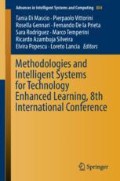Abstract
Gamification is one of the most used techniques to improve active participation and engagement in different kinds of contexts. The use of game techniques is effective in pushing subjects to be involved in an activity. Since the early childhood, indeed, the promises of rewards are useful to affect specific behaviors. On the other hands, the learning analytics have been largely implemented in education in order to improve the assessment and the self-assessment of students, above all in e-learning settings. The research presented in this work aims at combining gamification techniques and learning analytics to improve the engagement in University courses. The paper describes a model of gamification and a learning dashboard defined based on data in Moodle e-learning platform. A pilot test of an app android in which both the solutions have been implemented pointed out promising results.
Access this chapter
Tax calculation will be finalised at checkout
Purchases are for personal use only
References
Kennedy, J.: Characteristics of massive open online courses (MOOCs): a research review, 2009-2012. J. Interact. Online Learn. 13(1), 1–16 (2014)
Liyanagunawardena, T.R., Adams, A.A., Williams, S.A.: MOOCs: a systematic study of the published literature 2008-2012. 14(3), p. 26 (2013)
Pesare, E., Roselli, T., Rossano, V.: Visualizing student engagement in e-learning environment. In: 22th International Conference on Distributed Multimedia Systems (DMS), pp. 26–33. Knowledge Systems Institute, Skokie, IL 60076, USA (2016)
Chakor, Y.A., El Faddouli, N.-e: Abandonment of learners MOOC problematic analysis and proposed solutions. Int. J. Comput. Appl. 153(2), 35–37 (2016)
Bates, A.W.T.: Technology, E-learning and Distance Education. Routledge, London (2005)
Bennett, R.: Determinants of undergraduate student drop out rates in a university business studies department. J. Further High. Educ. 27(2), 123–141 (2003)
Clark, R.C., Mayer, R.E. (eds.): E-learning and the Science of Instruction: Proven Guidelines for Consumers and Designers of Multimedia Learning, 4th edn. Wiley, Hoboken, NJ, USA (2016)
Garrison, D.R.: E-Learning in the 21st Century: A Framework for Research and Practice. Psychology Press, London (2003)
Sun, P.-C., Tsai, R.J., Finger, G., Chen, Y.-Y., Yeh, D.: What drives a successful e-Learning? An empirical investigation of the critical factors influencing learner satisfaction. Comput. Educ. 50(4), 1183–1202 (2008)
Deterding, S., Dixon, D., Khaled, R., Nacke, L.: From game design elements to gamefulness: defining “gamification”. In: 15th International Academic MindTrek Conference: Envisioning Future Media Environments, pp. 9–15. ACM, New York, NY, USA (2011)
Salah, A.A., Schouten, B.A.M., Göbel, S., Arnrich, B.: Playful Interactions and Serious Games. IOS Press (2014)
Darina, D., Christo, D., Gennady, A., Galia, A.: Gamification in education: a systematic mapping study. J. Educ. Technol. Soc. 18(3), 75–88 (2015)
de-Marcos, L., Domínguez, A., Saenz-de-Navarrete, J., Pagés, C.: An empirical study comparing gamification and social networking on e-learning. Comput. Educ. 75, 82–91 (2014)
Klemke, R., Eradze, M., Antonaci, A.: The flipped MOOC: using gamification and learning analytics in MOOC design—a conceptual approach. Educ. Sci. 8(1), 25 (2018)
Chang, J.-W., Wei, H.-Y.: Exploring engaging gamification mechanics in massive online open courses. J. Educ. Technol. Soc. 19(2), 177–203 (2016)
Mazarakis, A.: Using gamification for technology enhanced learning: the case of feedback mechanisms. Bull. IEEE Tech. Comm. Learn. Technol. 17(4), 6–9 (2015)
Long, P., Siemens, G.: Penetrating the fog: analytics in learning and education. EducausE Rev. 46(5), 31–40 (2011)
Phillips, R., Preston, G., Roberts, P., Cumming-Potvin, W., Herrington, J., Maor, D., Gosper, M.: Using academic analytic tools to investigate studying behaviours in technology-supported learning environments (2010)
Pesare, E., Roselli, T., Rossano, V.: Engagement in Social Learning: Detecting Engagement in Online Communities of Practice, pp. 151–158. Springer International Publishing (2017)
Muñoz-Merino, P.J., Ruipérez-Valiente, J.A., Alario-Hoyos, C., Pérez-Sanagustín, M., Delgado Kloos, C.: Precise effectiveness strategy for analyzing the effectiveness of students with educational resources and activities in MOOCs. Comput. Hum. Behav. 47, 108–118 (2015)
Pesare, E., Roselli, T., Rossano, V., Di Bitonto, P.: Digitally enhanced assessment in virtual learning environments. J. Vis. Lang. Comput. 31, 252–259 (2015)
Siemens, G.: Learning analytics: envisioning a research discipline and a domain of practice. In: 2nd International Conference on Learning Analytics and Knowledge (LAK), pp. 4–8. ACM, New York, NY, USA (2012)
Author information
Authors and Affiliations
Corresponding author
Editor information
Editors and Affiliations
Rights and permissions
Copyright information
© 2019 Springer Nature Switzerland AG
About this paper
Cite this paper
Cassano, F., Piccinno, A., Roselli, T., Rossano, V. (2019). Gamification and Learning Analytics to Improve Engagement in University Courses. In: Di Mascio, T., et al. Methodologies and Intelligent Systems for Technology Enhanced Learning, 8th International Conference. MIS4TEL 2018. Advances in Intelligent Systems and Computing, vol 804. Springer, Cham. https://doi.org/10.1007/978-3-319-98872-6_19
Download citation
DOI: https://doi.org/10.1007/978-3-319-98872-6_19
Published:
Publisher Name: Springer, Cham
Print ISBN: 978-3-319-98871-9
Online ISBN: 978-3-319-98872-6
eBook Packages: Intelligent Technologies and RoboticsIntelligent Technologies and Robotics (R0)

